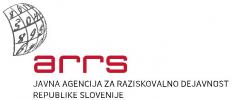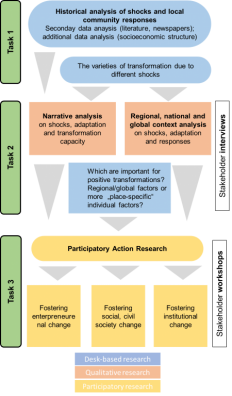Places that don’t matter? Socio-economic transformation of industrial towns in Switzerland and Slovenia
Principal Investigator at ZRC SAZU
David Bole, PhD-
Original Title
Mesta brez vrednosti? Družbeno-gospodarska preobrazba industrijskih mest v Švici in Sloveniji
Project Team
David Bole, PhD, Primož Gašperič, PhD, Maruša Goluža, PhD, Erik Logar, PhD, Asst. Prof. Jani Kozina, PhD, Janez Nared, PhD, Primož Pipan, PhD, Nika Razpotnik Visković, PhD, Anja Trobec, BA-
ARIS Project ID
N6-0157
-
Duration
1 November 2020–31 October 2024 -
Link to SICRIS
18145 -
Project Leader
dr. David Bole & dr. Heike Mayer
-
Financial Source
Javna agencija za raziskovalno dejavnost Republike Slovenije

SNSF - Swiss National Science Foundation

Partners
ZRC SAZU, GIAM, Universität Bern, Philosophisch-naturwissenschaftliche Fakultät, Geographisches…
The industrial sector accounts for a large share of employment in small and medium-sized towns (SMSTs) (see Kotzeva et al., 2016). The academic literature tends, however, to focus on industrial transformation in well-performing regions and large urban centres; making policy recommendations derived from such “best-practice models” ill-adapted to SMSTs’ contexts (see Florida et al., 2017; Miörner & Trippl, 2019). Researchers are increasingly interested in SMSTs to provide policymakers with contextualised place-based policies (see Servillo et al., 2014). Additional research must be conducted to understand how industrial and socio-economic transformation plays out in SMSTs. Using a comparative approach, we examine industrial and socio-institutional transformation in six industrial towns in Switzerland and Slovenia. The research methodology is based on in-depth comparative case-study approaches and participatory workshops to identify the processes behind industrial and socio-institutional transformation in SMSTs. The research project will attempt to provide an explanation to favour community-level responses when tackling industrial and socio-institutional transformation and mitigate increasing populist resentment from citizens in SMSTs who “feel that they don’t matter” compared with citizens in large urban centres (Rodríguez-Pose, 2018).
Picture: Methodological framework of the project (click on for picture)
- Task 1 (1st year): we will conduct a historical analysis on how and why different shocks (global – like the recent economic crisis or local – like the environmental crisis when shutting down mines etc.) happened. The goal is to trace the transformation trajectories of different industrial towns.
- Task 2 (2nd year): we will conduct qualitative research in each case study town. Narrative analysis will be used, whereby we will be able to interpret and attach meaning to local experiences of socio-economic transformation in times of shocks or important changes.
- Task 3 (3rd year): we will conduct a participatory action research to know how stakeholders at the community level respond to socio-economic transformation processes. This will be co-produced together with participants from the local community identified in first and second step of the research, by a series of workshops.
Project deliverables:
- Theoretical article about Industrial Culture
- Working Paper of the Task 1 (Transformation in industrial towns in Slovenia and Switzerland)
- Stories from three pilot areas in Slovenia (Idrija, Kočevje, Trbovlje) (in Slovene)
- Article on the transformation of Idrija, the main actors and the role of the mercury heritage
- Comparative article on development paths of three Slovenian small towns (Idrija, Kočevje and Trbovlje)
